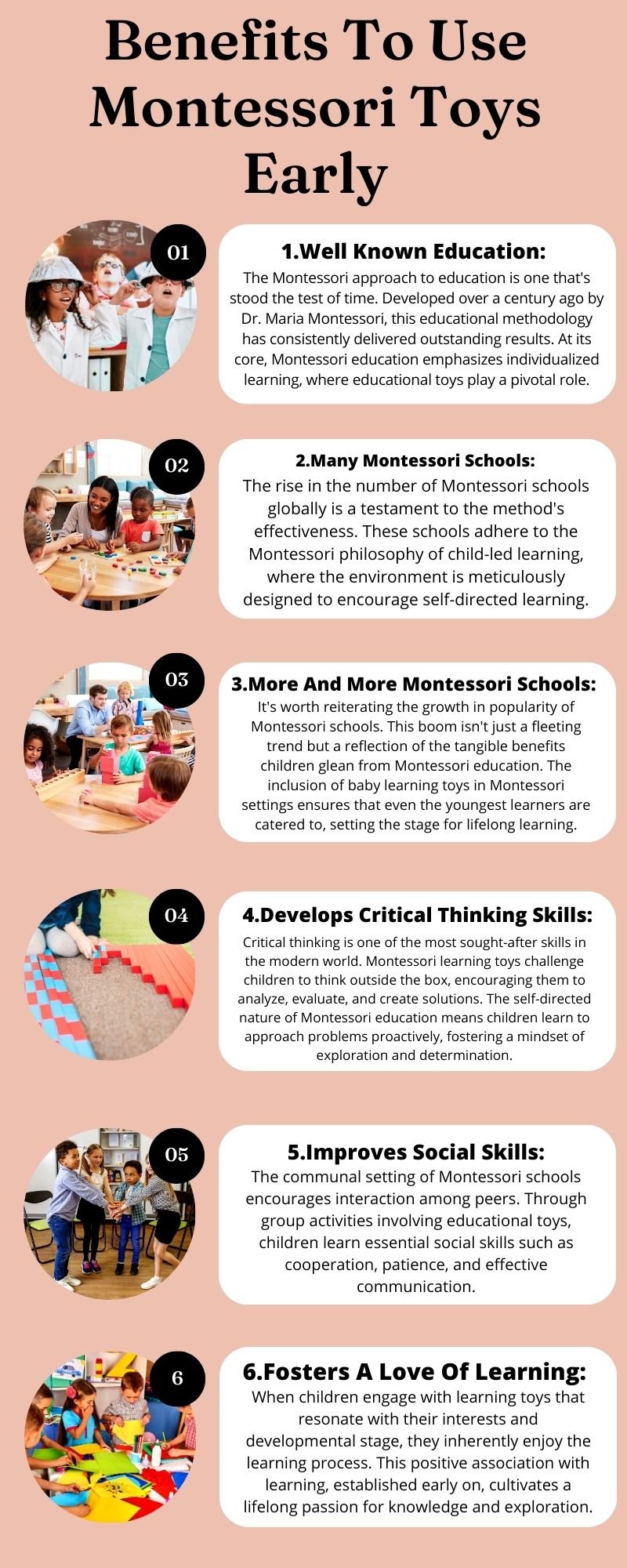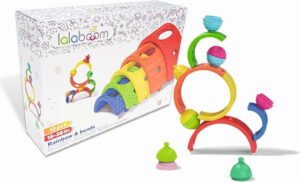In today’s fast-paced and ever-evolving world, it’s more crucial than ever to ensure our children receive the best educational tools available. One of the most revered methods in child education and development is the Montessori method. Through the use of Montessori learning toys, children can unlock a myriad of benefits that prepare them for future academic and life challenges.
Well Known Education
The Montessori approach to education is one that’s stood the test of time. Developed over a century ago by Dr. Maria Montessori, this educational methodology has consistently delivered outstanding results. At its core, Montessori education emphasizes individualized learning, where educational toys play a pivotal role.

Incorporating Montessori learning toys in a child’s early years is beneficial because these toys are specifically designed to cater to a child’s natural curiosity. They provide the right balance of challenge and engagement, ensuring the child remains interested while absorbing valuable skills and knowledge.
Many Montessori Schools
The rise in the number of Montessori schools globally is a testament to the method’s effectiveness. These schools adhere to the Montessori philosophy of child-led learning, where the environment is meticulously designed to encourage self-directed learning. Montessori educational toys are central to this environment, acting as instruments that facilitate discovery and understanding.
Given the surge in Montessori schools, it’s evident that parents and educators alike recognize the immense benefits offered by this method. By integrating Montessori baby learning toys into children’s daily routines, we are sowing the seeds for a strong educational foundation.
Children’s Development Based On Scientist Method Proven
One of the standout features of Montessori education is its grounding in scientific principles. Dr. Maria Montessori herself was a physician and scientist, and she developed her educational method by observing children and understanding their natural learning tendencies.
Montessori learning toys are not just fun playthings; they are rooted in developmental science. These educational toys are designed to cater to different developmental stages, ensuring children receive the appropriate stimuli to foster growth in various areas, be it cognitive, emotional, or physical.
More And More Montessori Schools
It’s worth reiterating the growth in popularity of Montessori schools. This boom isn’t just a fleeting trend but a reflection of the tangible benefits children glean from Montessori education. The inclusion of baby learning toys in Montessori settings ensures that even the youngest learners are catered to, setting the stage for lifelong learning.
Develops Critical Thinking Skills
Critical thinking is one of the most sought-after skills in the modern world. Montessori learning toys challenge children to think outside the box, encouraging them to analyze, evaluate, and create solutions. The self-directed nature of Montessori education means children learn to approach problems proactively, fostering a mindset of exploration and determination.
Improves Social Skills
The communal setting of Montessori schools encourages interaction among peers. Through group activities involving educational toys, children learn essential social skills such as cooperation, patience, and effective communication. These interactions solidify the foundations of strong interpersonal relationships in their later lives.
Supports Emotional Development
Beyond cognitive and social growth, Montessori learning toys play a role in emotional development. These toys often challenge children, teaching them to handle frustration and setbacks. As they overcome these challenges, they gain confidence and a more profound understanding of their emotions.
Enhances Creativity And Imagination
Montessori educational toys aren’t prescriptive. Instead, they’re open-ended, allowing children to use their imagination freely. Whether it’s building structures, crafting stories, or simply exploring different uses for a toy, the Montessori method champions creativity.
Fosters A Love Of Learning
When children engage with learning toys that resonate with their interests and developmental stage, they inherently enjoy the learning process. This positive association with learning, established early on, cultivates a lifelong passion for knowledge and exploration.
Develops Fine Motor Skills
Many Montessori toys are tactile, demanding precise hand-eye coordination. Be it threading beads, solving puzzles, or manipulating blocks, these activities refine children’s fine motor skills, preparing them for tasks like writing in the future.
Beyond the evident advantage of coordination, these toys also assist in muscle strength and dexterity. Activities that involve pinching, grasping, or twisting—common motions in Montessori educational toys—help strengthen the tiny muscles in a child’s hand and fingers. Over time, as they engage with these toys, they gain better control over movements, which not only aids in writing but also in everyday tasks like buttoning a shirt or tying shoe laces.
Moreover, the patience and focus required in such activities enhance a child’s concentration. The intricate details that some Montessori toys present mean that children need to hone in on the task at hand, sharpening their attention span in the process.
Encourages Problem-Solving
Encountering and overcoming challenges is integral to Montessori education. The educational toys within this method often pose problems that require thoughtful solutions, nurturing a child’s problem-solving abilities.
Furthermore, these toys help children understand the concept of cause and effect. As they manipulate Montessori learning toys and observe the outcomes of their actions, they begin to predict and anticipate results. This foundational understanding is crucial for analytical thinking in the later stages of their academic and personal lives.
Additionally, Montessori toys foster resilience and perseverance. Not all challenges are easily surmountable, and children will often encounter hurdles. The repeated process of trial and error, coupled with the joy of eventual success, instills a “can-do” attitude, teaching them that persistence often leads to solutions.
Supports Language Development
The communicative nature of many Montessori activities bolsters language development. Through narration, discussion, and role-play with learning toys, children expand their vocabulary and improve their articulation.
Montessori environments are rich in conversations. As children engage with toys and peers, they’re encouraged to express their thoughts and feelings. This continuous verbal exchange helps them internalize language structures and refine their speech patterns.
Additionally, several Montessori toys are designed to aid in phonetic understanding and letter recognition. By physically handling alphabet tiles or tracing sandpaper letters, children receive tactile feedback that reinforces their language learning. Moreover, when they interact with peers in Montessori settings, they are introduced to a variety of words and sentence structures, further enriching their language pool.
Final Words
In conclusion, the benefits of introducing Montessori toys early in a child’s life are manifold. From fostering critical thinking to enhancing creativity, these tools prepare children for a world that demands adaptability, resilience, and continuous learning. The Montessori method, with its scientific roots and proven results, remains an unparalleled approach to holistic child development.




